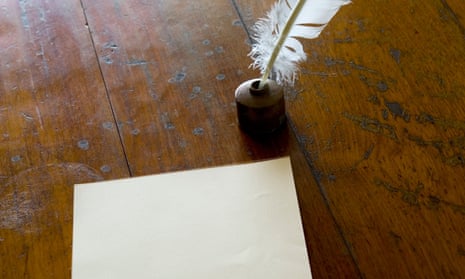There are very few stories that, on re-reading after re-reading, seem to become impossibly more perfect, but Herman Melville’s eerie, aching story Bartleby, the Scrivener is one such. Like a parable without an obvious moral, it is defiance raised to the metaphysical.
The plot is easily comprehensible; the meaning utterly elusive. The narrator, an unnamed New York lawyer, takes on a new scrivener, or copyist. Our lawyer describes his own philosophy as “the easiest way of life is the best” and relishes that he has a “snug retreat” where he can “do a snug business among rich men’s bonds and mortgages and title deeds”. He has two clerks already, nicknamed Turkey and Nippers, and a junior jack-of-all-trades, a boy called Ginger Nut.
Business is doing so well that the narrator takes on Bartleby, described as “pallidly neat, pitiably respectable, incurably forlorn”. He works “silently, palely, mechanically”, and on the third day of his employment is asked to proofread a document. He says – and it is almost the only thing he ever says in the story: “I would prefer not to.” He instead prefers, if anything, to look at the blank brick wall that is the entire view from his window.
Frustrated, Turkey and Nippers threaten to blacken his eye. The narrator, who prides himself on knowing about Astor on prudence, Edwards on will and Priestley on necessity, cajoles, offers alternative employment, even a room in his own house. He tries to garner the slightest biographical scraps: “Will you tell me, Bartleby, where you were born?” To which the answer is, of course: “I would prefer not to.”
It is never “no”, never “will not”, never even an outright refusal. It is never said aggressively or impertinently. Bartleby is always there when work starts and stays after they leave; on an unplanned visit on a Sunday, the narrator finds Bartleby there, and wonders if he is actually living in the offices. The overlooked subtitle is “A Story of Wall Street”; Bartleby is a strange premonition of the Occupy Movement.
Eventually, in frustration, the lawyer relocates his offices, but the new leaseholders become concerned about the man who sits all day on the banister. They eventually have Bartleby put in prison, where the narrator pays for him to have better meals, but he again prefers not to, and eventually dies of, what? Starvation? Melancholy? Because he did not prefer living?
Most of literature’s glorious proponents of defiance – I am thinking of Melville’s own Captain Ahab, but also Milton’s Satan in Paradise Lost, Nietzsche’s Zarathustra, or Steerpike in Peake’s Gormenghast trilogy – are defying the person in power, not the structure of power. Satan still wants there to be a universal monarchy, it’s just he wants to be its monarch.
Bartleby is different. His is a more powerful defiance; he is a figure who negates all the conventional, social, political and theological norms. He is absolutely outside the influence of what Jacques Lacan called the “Big Other”, that inner/outer voice that makes us gravitate towards a force that sanctions us. Bartleby is the politest form of rejecting all the reasons for which we have politeness.
Bartleby was one of the inspirations for Bartlebooth in Georges Perec’s Life: A User’s Manual. In that equally defiant book, Bartlebooth tours the world painting watercolours of ports, which are sent back to the apartment in Paris where he lives. There, they are made into jigsaws, which he then reassembles, has mounted, then bleached, then peeled away so that all that remains is a blank sheet with the incised lines of former artwork. Bartlebooth’s plan is to leave as little a trace as is possible that he has ever existed; he fails. Bartlebooth and Bartleby share a kind of revolutionary not-ness.
JG Ballard once wrote of a future Adolf Hitler emerging from the “timeless wastes” of “modern shopping malls”. Melville, I think, offers a more dangerously hopeful idea: that revolutionary resistance comes from a man in a conventional suit mildly stating there are things he would rather not do. It is, for Bartleby, the route to a kind of martyrdom.

Comments (…)
Sign in or create your Guardian account to join the discussion